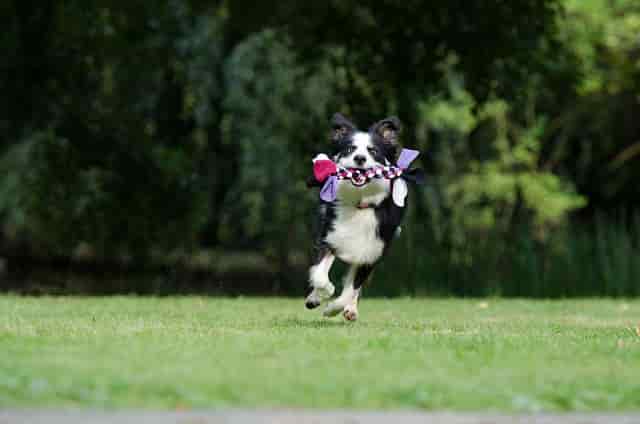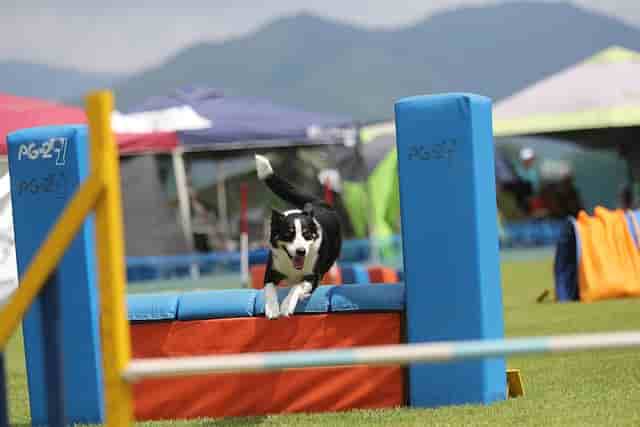
Border Collies are generally social animals and can get along well with other dogs, but there are some things to keep in mind. Some Border Collies can be aggressive towards other dogs, and this can be due to a lack of socialization or training. It is essential to socialize Border Collies from a young age and train them to interact appropriately with other dogs. Additionally, Border Collies have a strong herding instinct, which can sometimes manifest as chasing or nipping at other dogs, especially smaller breeds. It is crucial to monitor their interactions with other dogs and intervene if necessary.
Key Takeaways
- Border Collies can get along well with other dogs, but it depends on their temperament, socialization, and training.
- It is essential to socialize Border Collies from a young age and train them to interact appropriately with other dogs.
- Border Collies have a strong herding instinct, which can sometimes lead to chasing or nipping at other dogs, especially smaller breeds. It is crucial to monitor their interactions and intervene if necessary.
Border Collies and Other Dogs
Benefits of Socialization
Socialization is important for all dogs, but especially for Border Collies. Early socialization can help them become more comfortable around other dogs and people. It can also help prevent behavioral issues like aggression or fearfulness.
When socializing your Border Collie, be sure to expose them to a variety of dogs of different breeds, sizes, and energy levels. This will help them learn how to interact appropriately with other dogs. Positive reinforcement training can also be effective in teaching your Border Collie how to behave around other dogs.
Potential Challenges
While Border Collies are generally friendly and sociable, there are some potential challenges to keep in mind. Here are some things to consider:
- Herding Instinct: Border Collies have a strong herding instinct, which can sometimes cause them to try to herd other dogs. This can be annoying or even threatening to other dogs, especially if they are not used to it.
- Energy Level: Border Collies are high-energy dogs that require a lot of exercise and stimulation. This can sometimes be overwhelming for other dogs, especially if they are more laid-back or low-energy breeds.
- Aggression: Like any breed, Border Collies can be aggressive towards other dogs if they feel threatened or are not properly socialized. It’s important to monitor your Border Collie’s behavior around other dogs and intervene if necessary.
- Leash Reactivity: Some Border Collies can be reactive on leash, especially if they are not used to being around other dogs. It’s important to work on leash training and socialization to prevent this behavior.
When introducing your Border Collie to other dogs, it’s important to do so in a controlled and supervised environment. Avoid introducing them to dogs that are known to be aggressive or unfriendly. Some breeds that Border Collies may get along well with include German Shepherds, Australian Shepherds, Golden Retrievers, Labradors, Dalmatians, English Pointers, Boxers, Siberian Huskies, and Standard Poodles.
Overall, with proper socialization and training, Border Collies can make great companions for other dogs.

Border Collie Temperament and Personality
Traits That Make Them Good with Other Dogs
Border Collies are a social breed that enjoys companionship. They are highly trainable and respond well to socialization and training. With proper socialization, they can learn to get along well with other dogs. They are also excellent herding dogs and have a natural instinct to work with other animals. This can translate into a friendly and cooperative demeanor when interacting with other dogs.
Potential Challenges
Despite their friendly nature, Border Collies can be wary of other dogs. They have a strong desire to herd, and this can sometimes lead to aggressive behavior towards other dogs, especially if they are not properly socialized. Additionally, their high energy levels can be overwhelming for some dogs, leading to conflicts.
It is important to note that not all Border Collies are the same. While some may be naturally friendly towards other dogs, others may require more socialization and training to get along well with their furry counterparts. It is also important to consider the personality and energy levels of the other dog when introducing them to a Border Collie.

Physical and Mental Exercise for Border Collies
Physical Exercise
Border Collies are high-energy dogs that require plenty of physical exercise to stay healthy and happy. A full-grown Border Collie needs at least 2 hours of exercise per day. This breed was originally bred as a herding dog, so they have a lot of energy and love to run, play, and work. Without enough exercise, they can become bored and develop behavioral problems.
There are many ways to exercise a Border Collie. Running, playing fetch, and going for long walks are all great options. Swimming is also a good way to exercise a Border Collie, as it is low-impact and helps to build muscle. It is important to note that Border Collies should not be left alone in a yard for long periods of time. They need to be mentally stimulated and engaged with their owners.
Mental Stimulation
In addition to physical exercise, Border Collies also need plenty of mental stimulation. They are intelligent dogs that thrive on learning new things and being challenged. Mental stimulation can tire a Border Collie out just as much as physical exercise.

There are many ways to provide mental stimulation for a Border Collie. One way is to teach them new tricks and commands. Obedience classes can be a great way to teach a Border Collie new skills and to socialize them with other dogs. Another way to provide mental stimulation is to play games with them, such as hide and seek, frisbee, or tug of war. Providing them with puzzle toys and interactive games can also help to keep them mentally stimulated.
It is important to note that mental stimulation should be combined with physical exercise. A Border Collie that is mentally stimulated but not physically exercised can still become bored and develop behavioral problems.
Pros and Cons of Owning a Border Collie
Border Collies are an intelligent, active, and highly trainable breed that can make excellent pets. However, before deciding to bring one into your home, it’s important to consider the pros and cons of owning a Border Collie, particularly when it comes to their interactions with other dogs.
Pros
- Socialization: With proper socialization and training, Border Collies can be great with other dogs, including those outside of their own breed.
- Herding Instinct: Border Collies have a natural herding instinct, which can make them excellent at controlling and managing other dogs.
- Active Lifestyle: Border Collies are high-energy dogs that require a lot of exercise, making them ideal for people who enjoy an active lifestyle and want a companion for outdoor activities like hiking, running, and biking.
- Mental Stimulation: Border Collies are intelligent dogs that require mental stimulation to stay happy and healthy. They thrive on training, games, and other activities that challenge their minds.
- Loyal Companions: Border Collies are known for their loyalty and can make excellent companions for those who are looking for a dog that will be by their side through thick and thin.
Cons
- Sensitive to Sounds: Border Collies can be sensitive to loud or sudden noises, which can make them anxious or fearful around other dogs that bark or make a lot of noise.
- Large Size: Border Collies are a medium to large breed, which can make them intimidating to other dogs, particularly smaller breeds.
- Protective Instincts: Border Collies can be protective of their owners and their territory, which can lead to aggression towards other dogs if not properly trained and socialized.
- High Energy: Border Collies require a lot of exercise and mental stimulation to stay happy and healthy, which can be challenging for owners who are not able to provide them with enough physical and mental activity.
- Herding Instinct: While Border Collies’ herding instincts can be a pro when it comes to managing other dogs, it can also lead to them trying to herd other dogs, which can be annoying or even dangerous for other dogs.

Frequently Asked Questions
What dogs do Border Collies not get along with?
Border Collies are known to be a bit clannish and can be picky about their doggy friends. They tend to prefer the company of other Border Collies or dogs that have similar personalities. Border Collies may not get along well with dogs that are hyperactive or out of control. They may also have issues with dogs that are too dominant or aggressive.
Do Border Collies get along well with other dogs?
Border Collies can get along well with other dogs if they are socialized properly from a young age. However, they may still have a preference for other Border Collies or dogs with similar personalities. It is important to supervise your Border Collie when they are interacting with other dogs to ensure that they are playing nicely and not getting into any fights.
Are Border Collies aggressive to other dogs?
Border Collies are not typically aggressive towards other dogs. However, they can become aggressive if they feel threatened or if they are not socialized properly. It is important to train your Border Collie to be well-behaved around other dogs and to supervise them when they are interacting with other animals.
Are Border Collies good with small dogs?
Border Collies can be good with small dogs if they are socialized properly from a young age. However, they may have a strong prey drive and may try to chase or herd small dogs. It is important to supervise your Border Collie when they are interacting with small dogs to ensure that they are playing nicely and not getting too rough.
Getting a second dog with a Border Collie?
Border Collies can do well with a second dog if they are introduced properly and if the second dog has a similar personality. It is important to supervise their interactions and to make sure that they are getting along well. It is also important to make sure that your Border Collie is still getting enough attention and exercise even with a second dog in the house.
Are Border Collies good with cats?
Border Collies can be good with cats if they are socialized properly from a young age. However, they may have a strong prey drive and may try to chase or herd cats. It is important to supervise your Border Collie when they are interacting with cats to ensure that they are playing nicely and not getting too rough.